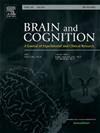On the biphasic nature of the N400-P600 complex underlying language comprehension
IF 1.4
3区 心理学
Q3 NEUROSCIENCES
引用次数: 0
Abstract
The ERP literature on language comprehension reveals variability in observing monophasic N400 versus biphasic N400-P600 effects in response to incongruent input, with the reasons for this inconsistency remaining unclear. Two interrelated factors may contribute: spatiotemporal overlap between the N400 and P600, where a strong N400-effect can obscure the P600, and the P600’s sensitivity to depth of processing, as determined by the experimental setting. Building on previous findings reporting monophasic N400-effects with plausibility judgments, we investigated whether comprehension questions, encouraging more natural reading and deeper processing of the full content, would elicit a biphasic effect, suggesting reduced component overlap in such settings. Using a design fully crossing lexical association and plausibility, we found that the N400 is modulated by association and the P600 by plausibility. Crucially, a biphasic pattern emerged for implausible and unrelated words, suggesting a mitigation of component overlap compared to previous studies employing plausibility judgments. We interpret the results in light of current accounts of the N400 and P600, arguing that the empirical evidence strongly supports single-stream over multi-stream models. Importantly, our findings highlight the critical role of both component overlap and task demands in shaping the data that inform the development and evaluation of theoretical models.
论N400-P600复杂底层语言理解的双相性
语言理解方面的ERP文献揭示了在观察单相N400和双相N400- p600对不一致输入的反应时的差异,但这种不一致的原因尚不清楚。两个相互关联的因素可能起作用:N400和P600之间的时空重叠,其中强烈的N400效应会掩盖P600,以及P600对加工深度的敏感性,这是由实验设置决定的。基于先前关于单相n400效应与合理性判断的研究结果,我们研究了理解问题,鼓励更自然的阅读和对完整内容的更深入的处理,是否会引起双相效应,这表明在这种情况下减少了组件重叠。使用完全交叉词汇关联和似然性的设计,我们发现N400受关联调节,P600受似然性调节。至关重要的是,对于不可信和不相关的词,出现了双相模式,这表明与之前使用可信性判断的研究相比,成分重叠有所减轻。我们根据N400和P600的当前账户来解释结果,认为经验证据强烈支持单流而不是多流模型。重要的是,我们的研究结果强调了组件重叠和任务需求在塑造数据方面的关键作用,这些数据为理论模型的发展和评估提供了信息。
本文章由计算机程序翻译,如有差异,请以英文原文为准。
求助全文
约1分钟内获得全文
求助全文
来源期刊

Brain and Cognition
医学-神经科学
CiteScore
4.60
自引率
0.00%
发文量
46
审稿时长
6 months
期刊介绍:
Brain and Cognition is a forum for the integration of the neurosciences and cognitive sciences. B&C publishes peer-reviewed research articles, theoretical papers, case histories that address important theoretical issues, and historical articles into the interaction between cognitive function and brain processes. The focus is on rigorous studies of an empirical or theoretical nature and which make an original contribution to our knowledge about the involvement of the nervous system in cognition. Coverage includes, but is not limited to memory, learning, emotion, perception, movement, music or praxis in relationship to brain structure or function. Published articles will typically address issues relating some aspect of cognitive function to its neurological substrates with clear theoretical import, formulating new hypotheses or refuting previously established hypotheses. Clinical papers are welcome if they raise issues of theoretical importance or concern and shed light on the interaction between brain function and cognitive function. We welcome review articles that clearly contribute a new perspective or integration, beyond summarizing the literature in the field; authors of review articles should make explicit where the contribution lies. We also welcome proposals for special issues on aspects of the relation between cognition and the structure and function of the nervous system. Such proposals can be made directly to the Editor-in-Chief from individuals interested in being guest editors for such collections.
 求助内容:
求助内容: 应助结果提醒方式:
应助结果提醒方式:


